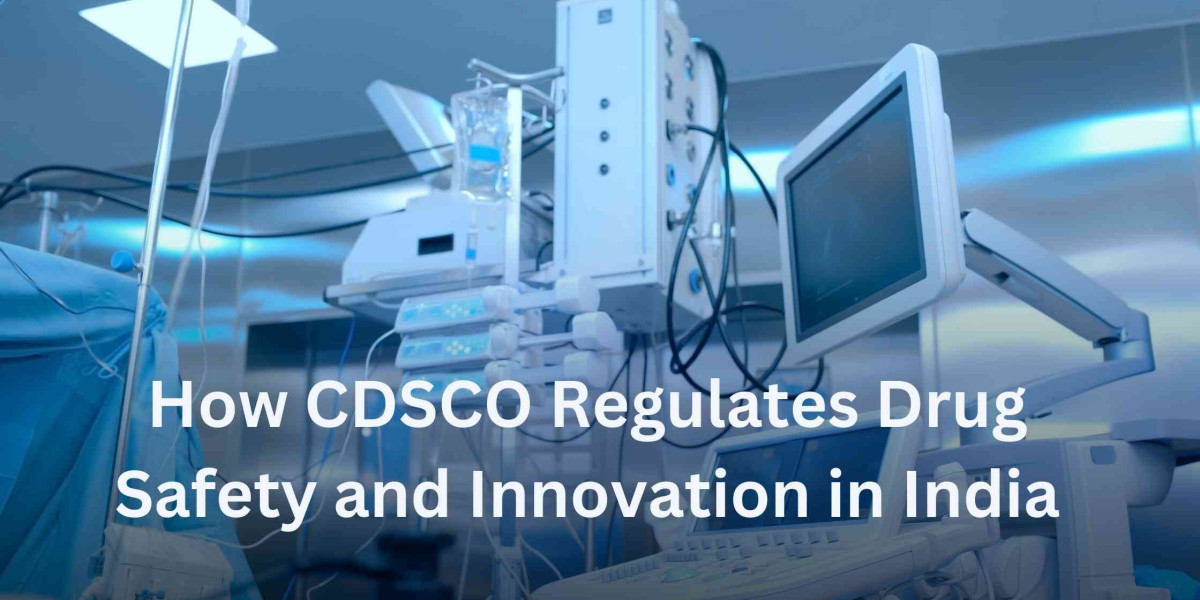The Central Drugs Standard Control Organization (CDSCO) plays a vital role in ensuring that drugs, medical devices, and even cosmetics in India meet high standards of safety, efficacy, and quality. This regulatory body operates under the Ministry of Health and Family Welfare and is responsible for overseeing the pharmaceutical, medical device, and cosmetic sectors. CDSCO’s efforts not only protect public health but also encourage innovation in drug development.
This blog will explain how CDSCO registration Certificate in India helps and regulates drug safety while promoting innovation in India, along with insights into licenses like CDSCO Cosmetic Import Registration, CDSCO Cosmetic Manufacturing License, CDSCO Drugs Import License, and CDSCO Medical Device Import License.
What Is CDSCO?
CDSCO is the main regulatory authority in India responsible for the approval and monitoring of drugs, medical devices, cosmetics, and clinical trials. The organization works under the provisions of the Drugs and Cosmetics Act, 1940, and the Drugs and Cosmetics Rules, 1945. Its primary goal is to ensure that the products sold in India are safe and effective for public use.
CDSCO handles various responsibilities, including issuing the CDSCO Cosmetic Import Registration, CDSCO Cosmetic Manufacturing License, CDSCO Drugs Import License, and CDSCO Medical Device Import License in India. Each of these licenses ensures that imported or locally manufactured products meet the required safety and quality standards.
CDSCO’s Role in Drug Safety
One of CDSCO's main responsibilities is to regulate drug safety in India. This involves multiple processes, from the approval of new drugs to the continuous monitoring of drugs that are already on the market. Let’s look at the key steps involved in this process.
1. Drug Approval Process
Before a new drug can be sold in India, it must be approved by CDSCO. This involves a thorough review of data on the drug’s safety, quality, and effectiveness. Pharmaceutical companies are required to submit the results of pre-clinical studies (laboratory research) and clinical trials (tests on humans) to CDSCO for evaluation.
The drug approval process can be broken down into the following phases:
- Pre-clinical Trials: The drug is tested in laboratories on animals or cells to determine its safety and biological activity.
- Clinical Trials: If the pre-clinical trials are successful, the drug enters clinical trials, which are conducted on human subjects. These trials are divided into four phases:
- Phase I: Tests on a small group of healthy individuals to assess the drug’s safety and dosage.
- Phase II: Tests on a larger group of people to evaluate the drug’s effectiveness and side effects.
- Phase III: Tests on an even larger group to confirm its effectiveness, monitor side effects, and compare it with existing treatments.
- Phase IV: Post-marketing surveillance after the drug is approved and released to the public, to ensure long-term safety and effectiveness.
Only after successfully passing these phases can a drug be approved by CDSCO for sale in the market. Once approved, the manufacturer may also need to obtain the CDSCO Drugs Import License in India if the drug is being imported into India.
2. Monitoring of Approved Drugs
Even after a drug is approved and available to the public, CDSCO continues to monitor its safety. This is done through a process called pharmacovigilance, which involves collecting, analyzing, and acting on information about adverse drug reactions (ADRs) and other problems that may arise.
If CDSCO finds that a drug poses unexpected risks or side effects, it can take action by issuing warnings, restricting the drug’s use, or even banning the drug altogether.
3. Quality Control and Inspections
CDSCO also works with state-level drug control authorities to ensure that drugs sold in the market meet quality standards. Regular inspections are carried out at manufacturing plants to check for compliance with Good Manufacturing Practices (GMP). These inspections help ensure that drugs are produced in clean, safe environments and meet the required standards for strength, quality, and purity. The same principles apply to cosmetics, and manufacturers may need to obtain the CDSCO Cosmetic Manufacturing License in India before production begins.
Promoting Innovation in Drug Development
While regulating drug safety is a key focus, CDSCO also encourages pharmaceutical companies to innovate. New drug development is crucial for treating diseases, improving patient outcomes, and fostering the growth of the healthcare industry. CDSCO helps promote innovation in several ways.
1. Facilitating Faster Approvals
CDSCO offers pathways to expedite the approval of drugs that treat serious or life-threatening conditions, especially when there is an unmet medical need. Through the Accelerated Approval Process, companies can bring new drugs to market more quickly, provided there is sufficient evidence of their safety and potential benefit.
2. Supporting Clinical Trials
To foster innovation, CDSCO supports clinical trials in India by offering clear guidelines and timely approvals. India has become a hub for clinical research because of its diverse population and skilled workforce, and CDSCO works to maintain a regulatory environment that balances patient safety with the need for innovation.
In addition, CDSCO offers a Test License for research purposes, which allows companies to conduct clinical or non-clinical trials on drugs. The CDSCO Test License in India is crucial for the research and development phase of drug innovation.
3. Collaboration with International Agencies
CDSCO collaborates with global regulatory agencies such as the U.S. Food and Drug Administration (FDA), the European Medicines Agency (EMA), and the World Health Organization (WHO). These partnerships help India stay up-to-date with global standards and encourage the development of innovative drugs that meet international quality benchmarks.
4. Regulatory Flexibility for Emerging Therapies
As new and emerging therapies like gene therapy, biologics, and personalized medicine gain prominence, CDSCO is working to create flexible regulatory frameworks that can accommodate these innovations. This includes offering special guidelines and fast-track approval processes for novel treatments.
Challenges Faced by CDSCO
Despite its critical role, CDSCO faces several challenges in regulating drug safety and innovation:
- Limited Resources: CDSCO has a vast and complex role but often operates with limited resources, which can slow down the approval and monitoring processes.
- Counterfeit Drugs: India’s large and unregulated market makes it vulnerable to counterfeit or substandard drugs, which pose risks to public health.
- Balancing Safety and Innovation: While encouraging innovation is important, CDSCO must ensure that new drugs are thoroughly tested for safety. Striking the right balance between innovation and safety remains a challenge.
The Future of CDSCO
Looking ahead, CDSCO is expected to play an even bigger role in shaping India’s pharmaceutical and healthcare landscape. With advancements in technology, such as artificial intelligence (AI) and big data, CDSCO may be able to improve its regulatory processes and ensure faster, more accurate drug approvals and monitoring.
As India's pharmaceutical and medical device industries expand, the demand for import and manufacturing licenses, such as the CDSCO Medical Device Import License and the CDSCO Cosmetic Import Registration in India, is expected to grow. CDSCO’s role in issuing these licenses will be crucial in maintaining the safety and quality of products in the Indian market.
Conclusion
The Central Drugs Standard Control Organization (CDSCO) plays a critical role in regulating drug safety and encouraging innovation in India’s pharmaceutical industry. By ensuring that drugs undergo rigorous testing, quality control, and post-market monitoring, CDSCO helps protect public health. At the same time, its support for clinical trials, fast-track approvals, and collaboration with international agencies fosters innovation.
In addition to drug safety, CDSCO also regulates the import and manufacturing of medical devices and cosmetics through various licenses such as CDSCO Cosmetic Import Registration, CDSCO Cosmetic Manufacturing License, CDSCO Drugs Import License, and CDSCO Medical Device Import License. These licenses ensure that products entering the Indian market meet high standards of safety and quality.
While challenges exist, CDSCO’s efforts are essential to maintaining India’s reputation as a global hub for pharmaceuticals, medical devices, and cosmetics.








